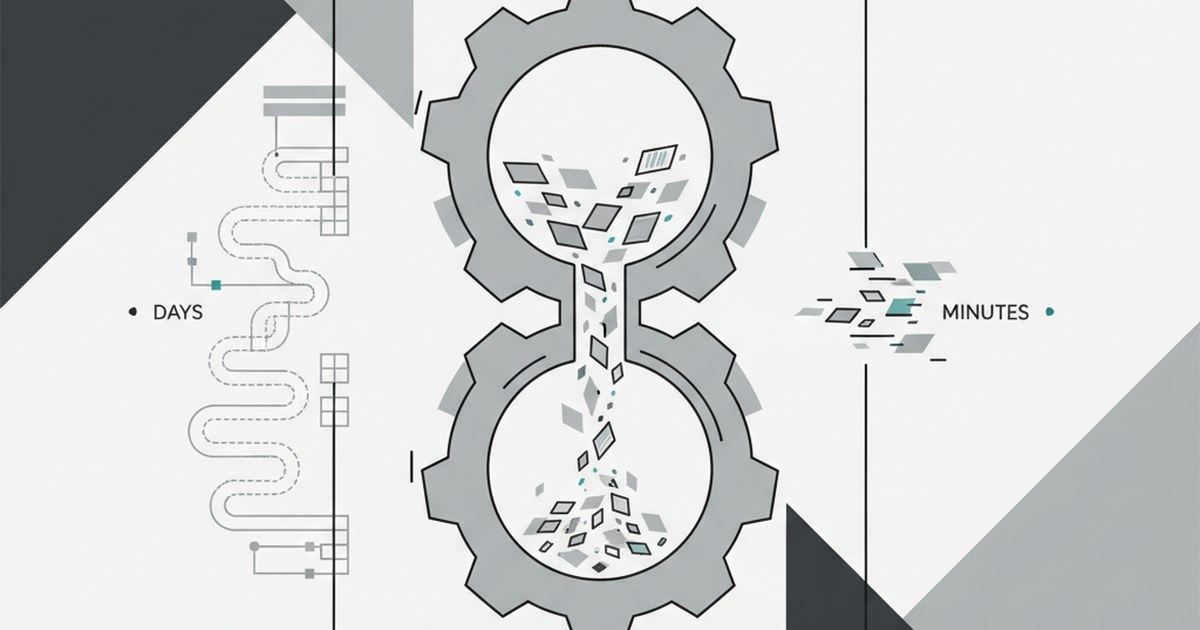From Days to Minutes: The New Era of Quote Evaluation
Modern businesses are slashing quote evaluation time from days to minutes. Through technology, data analytics, and collaboration, procurement leaders can make faster, more accurate decisions, reducing costs and boosting their competitive edge.

From Days to Minutes: The New Era of Quote Evaluation
In today's fast-paced business landscape, procurement, supply chain, and operations leaders are faced with an ongoing challenge: how to make faster decisions without sacrificing accuracy. Traditional methods of evaluating quotes often extended over days or even weeks, hindering the agility that is essential for maintaining a competitive edge. As businesses strive to adapt to a rapidly changing environment, the need for efficient quote evaluation processes has never been more urgent. Fortunately, advancements in technology and strategic thinking are reshaping this process, taking it from days to mere minutes.The Shifting Landscape of Procurement
Gone are the days when procurement was a back-office function with long lead times. Modern procurement is now at the forefront of strategic decision-making. According to a recent study, companies that optimize their procurement processes can reduce costs by up to 20% while improving supplier relationships. This shift is driven largely by the need for organizations to be agile and responsive, particularly amidst global supply chain uncertainties. Take, for instance, a mid-sized manufacturing firm that adopted cloud-based procurement tools. By leveraging real-time data analytics, the company was able to shrink its average quote evaluation time from ten days to less than an hour. This was achieved by automating repetitive tasks, streamlining communication with suppliers, and quickly assessing market prices. The firm not only saved significant time but also enhanced its relationships with suppliers, fostering trust and collaboration.Embracing Technology for Enhanced Efficiency
The role of technology in quote evaluation is transformative. Artificial Intelligence (AI) and machine learning algorithms can expedite the evaluation process by automating routine tasks like data entry and cross-referencing supplier capabilities. A logistics company recently shared its success in utilizing AI to evaluate quotes. By training its system on historical data, it could predict the best suppliers for various projects based on price, quality, and delivery times. Quotes that once took days to evaluate were processed in mere moments, allowing the company to seize opportunities far more swiftly than its competitors. Moreover, technology facilitates real-time updates, ensuring that procurement teams work with the most current data. This capability allows for more accurate evaluations and decisions that reflect present market conditions. As a result, companies are not only speeding up their quote evaluations but are also bolstering their negotiation leverage.The Importance of Collaborative Communication
Efficient quote evaluation is not solely reliant on technology; it also hinges on effective communication among all stakeholders involved. Traditionally, the procurement process has operated in silos, reducing transparency and slowing down decision-making. However, fostering an environment of collaboration can significantly enhance the speed and quality of quote evaluations. Consider a global retailer that implemented regular cross-departmental meetings to discuss procurement strategies. By bringing procurement, operations, and finance teams together, the company identified potential bottlenecks in the quote evaluation process. Teams could address supplier concerns more proactively and align on priorities, resulting in a streamlined workflow. It became normal for quotes to shift from evaluation to decision in less than an hour, allowing the company to remain ahead of market trends and customer demands.Data-Driven Decisions for Staying Competitive
Leveraging historical data for predictive insights can refine quote evaluation to new levels. Organizations that utilize data analytics can identify patterns and trends in supplier performance, pricing fluctuations, and lead times. This data empowers procurement professionals to make informed decisions, choosing the best suppliers quickly and efficiently. For instance, a tech company facing variable pricing from suppliers utilized data analytics to create a comprehensive view of supplier performance over time. By evaluating past quotes and associated outcomes, they could predict more accurately which suppliers would not only provide competitive pricing but also reliable quality and delivery reliability. This transition to a data-driven approach allowed the team to evaluate quotes in minutes instead of days, resulting in more favorable contract negotiations and better supplier arrangements.Building Agile Supplier Networks
Establishing a flexible and agile supplier network plays a critical role in enhancing quote evaluation processes. Companies that cultivate strong relationships with multiple suppliers can quickly pivot when needed, reducing lead times and enabling faster evaluations. An automobile manufacturer that diversified its supplier base saw remarkable improvements in its procurement strategy. Instead of relying on a handful of suppliers for critical components, it forged partnerships with multiple vendors, each with unique strengths. This strategy allowed for better price comparison and quicker turnaround times on quotes. When a quote from one supplier took too long to finalize, the procurement team could shortlist others immediately, significantly reducing the time taken to finalize contracts.Achieving Measurable Outcomes in Business
In an age where speed and agility are top priorities, rethinking quote evaluation processes is essential for procurement, supply chain, and operations leaders. The shift from lengthy evaluations to quicker assessments not only enhances operational efficiency but results in tangible business outcomes. Organizations that embrace technology, hold collaborative discussions, leverage data analytics, and build agile supplier networks see measurable gains in both time and cost reductions. As procurement teams seek to optimize their processes, the benefits ripple throughout the organization. Faster decision-making leads to improved supplier relationships, more effective negotiation strategies, and ultimately, a stronger bottom line. By moving quote evaluations from days to minutes, businesses position themselves to respond swiftly to market demands, harness emerging opportunities, and gain the competitive advantage required in today’s dynamic business environment. It's clear that now is the time for procurement leaders to transform their approach to quote evaluation. In doing so, they not only enhance their own efficiency but contribute significantly to their company’s overall agility and success. Embracing this new era could well be the key to thriving in a landscape defined by constant change and competition.Further Reading
Recommended Resource Sales Engineer Procurement Solution
Generate rapid budgetary estimates and find new vendors instantly.
Grow with Purchaser
Ready to resolve your sourcing bottlenecks?
Purchaser helps you identify and eliminate supply chain delays while streamlining your entire procurement process.
Join leading companies optimizing their supply chain.
